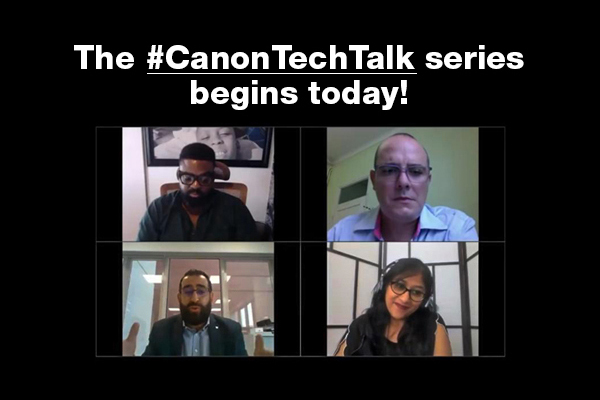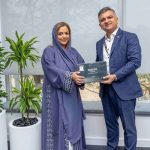The webinar focussed on how filmmaking in Africa got a significant boost with new digital technologies.
Canon Central and North Africa (CCNA) unveiled a knowledge-sharing initiative for the African filmmaking community called ‘Canon Tech Talk Series’, during a webinar on Tuesday which discussed filmmaking in Africa. The new initiative will extend for three months over 42 free pro-video webinars for the film market in Africa and will be conducted in various languages including English, French and Arabic with the aim of reaching a larger audience.
On August 11, the first webinar featured Canon’s Sales and Marketing Director for Canon Central and North Africa (CCNA), Amine Djouhara, alongside African filmmakers Hamoudi Laggoune and Kunle Afolayan. The panel was moderated by Vijaya Cherian, Editor of BroadcastProME magazine.
The opening session explored the features of the Canon C500 Mark II, where the filmmakers shared their experience with the camera during their recent high-profile productions, which were fortunately concluded just prior to the coronavirus outbreak.
The CCNA team will continue with its Tech Talk series, which will cover vlogging, streaming, colour science, post-production, and a range of other topics that would help aspiring filmmakers and young talent learn more about cinematic techniques and technical subjects. The remaining 18 webinars, divided between beginner and professional courses, will take place in three different languages (English, French and Arabic).
The first Canon Tech Talk Series free webinar will start today at 4 pm UAE time, featuring Nigerian filmmaker Kunle Afolayan, who will discuss the new C500 Mark II camera. The webinar will be conducted in English.
Afolayan’s films are part of a growing number of African contributions to the global online platform Netflix. His film Mokalik featured on Netflix. His latest production, Citation, explores the important issue of sexual exploitation of young female Nigerian students by their professors. This film was shot with the new EOS C500 Mark II from Canon.
“I first saw the Canon EOS C500 Mark II at IBC 2019 and was amazed at its capabilities. Normally, it’s not a director’s place to tell a director of photography (DOP) what kit to use, but I always wanted to shoot in 4K full-frame, and I knew that this camera would make it to the Netflix-approved list, which was vital to this production,” Afolayan said. “Thankfully Jonathan Kovel, the DOP working on my new film, loved the camera; therefore, we were able to shoot Citation with the Canon EOS C500 Mark II.”
The latest model in Canon’s Cinema EOS Camera range features the 35mm 4K CMOS sensor and comes with 16+ stops of dynamic range, professional codecs in a compact, modular body.
Other features include a full-frame sensor powered by Canon’s DIGIC DV 7 processor. The sensor’s expansive native cinema gamut allows for greater colour-grading freedom in both SDR and HDR productions.
The camera also offers the ability to record 5.9K Cinema RAW Light onto allegedly faster storage media, CF express cards, and offers simultaneous recording of the same file format due to dual CF express card slots.
The second panelist, Algerian cinematographer Hammoudi Laggoune, who worked with well-known director Merzak Allouache on his latest film, Une Famille, also used the Canon EOS C500 Mark II for this feature as part of a technical partnership with Baya Productions.
“The film benefited from the technology provided by Canon. The production team was provided with a Canon EOS C500 Mark II camera and a range of cine lenses and accessories so that the film could be shot entirely in 5.9K at 24 fps. The EOS 5D Mark IV and EOSR were also used throughout, to shoot the film and to photograph the behind-the-scenes footage,” said Laggoune.
“The camera provides complete flexibility and freedom to choose the image formats, bokeh effects and lenses that are best suited to the filming conditions,” he added.
Commenting on the new initiative, Canon’s Amine Djouhara said: “Canon’s continuous relationship with empowering the African creative market via innovative technology has supported the rise of Africa’s content. Our focus is on offering leading industry know-how and award-winning cameras and lenses built for enthusiast and professional level creatives.
“The Cinema EOS range is the perfect expression of form and function, exceptionally adaptable to virtually any production with its modular design, and we are excited to see what Africa’s talented filmmakers create.”
He added: “Now more than ever, we must come together to ensure that the global standstill does not set us back in our careers or our passion-projects. During these challenging times, this series of webinars offer a virtual developmental tool to maintain the evolution of critical skills for continued and sustainable growth of the film industry.”
















































































